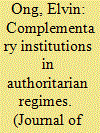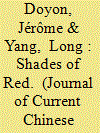| Srl | Item |
| 1 |
ID:
142075


|
|
|
|
|
| Summary/Abstract |
Recent political science research has suggested that autocrats adopt a variety of institutions such as nominally democratic elections and ruling parties to buttress authoritarian durability. In this article I investigate the role of constituency service in an authoritarian regime. I argue that Singapore's Meet-the-People Sessions (MPS) is a complementary institution that can serve to mitigate the weaknesses of other authoritarian institutions, thereby entrenching authoritarianism, rather than serve as a form of democratic representation. First, it is a mechanism to gain valuable everyday information about grievances within the population, thereby allowing the ruling People's Action Party (PAP) to formulate policies and effectively target its response. Second, it is a convenient venue to recruit and socialize ordinary party members, thus helping the PAP forestall potential party decay. Symbolically, conducting MPS is a material performance of the hegemonic ideology of elitism between PAP politicians and ordinary Singaporeans.
|
|
|
|
|
|
|
|
|
|
|
|
|
|
|
|
| 2 |
ID:
189220


|
|
|
|
|
| Summary/Abstract |
While changes in Chinese Communist Party (CCP) recruitment are generally described as different phases focused on recruiting either “reds” or “experts,” giving more or less weight to political or technical criteria, we instead stress the importance of changing understandings of political loyalty to examine these evolutions. By tracing these changes throughout the party's 100 years, we show that how the party understands loyalty is largely strategic, detached from a purely ideological approach. The CCP has alternatively approached loyalty in ascriptive terms, based on class background, and behavioural ones, looking at active displays of loyalty or passive obedience. The level and form of activism expected from party members and cadres have also dramatically changed over time. Relying on recruitment data, this article shows that it is paradoxically during periods of party expansion that the CCP becomes more politically demanding with its members.
|
|
|
|
|
|
|
|
|
|
|
|
|
|
|
|